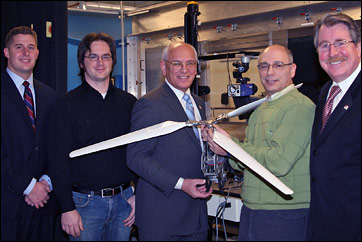
New Research Center To Tackle Critical Challenges Related to Aircraft Design, Wind Energy, Smart Buildings
Rensselaer Polytechnic Institute today announced the new Center for Flow Physics and Control (CeFPaC) within the School of Engineering.
The interdisciplinary research center seeks to answer fundamental questions and innovate new application-driven solutions for performance enhancement of fluid systems. From designing smarter blades for wind turbines to developing new techniques for reducing aircraft drag, CeFPaC is poised to make an important impact in the rapidly emerging field of active flow control.
Leading CeFPaC as director is Michael Amitay, professor in the Department of Mechanical, Aerospace, and Nuclear Engineering at Rensselaer.
“By establishing the new Center for Flow Physics and Control, Rensselaer has further positioned itself as a key player in the expanding field of active flow control. This center creates exciting new opportunities for our students – who are already highly sought-after by major aerospace engineering firms – and faculty researchers,” said David Rosowsky, dean of the School of Engineering at Rensselaer. “We are proud to launch this new center in the School of Engineering and look forward to its continued success.”
“The ability to manipulate a flow field to affect a desired change is of immense practical importance. As a scientific discipline and as technological curiosity, flow control is a hot topic in both science and engineering,” Amitay said. “In our new center, we will advance the state of the art in smart wind turbine blades, green airplanes, smart buildings, and more.”
CeFPaC researchers are investigating flow physics, prediction models, and control schemes. This entails a combination of basic research aimed at developing and verifying theories for fluid dynamic behavior, and the modeling and application of these theories toward controlling flows. The center builds from Amitay’s research into active and passive flow control techniques and their many applications in aerodynamics and fluid mechanics. Amitay said he is actively seeking additional funding opportunities and industrial partnerships.
The new center will focus on research in the following areas:
Flow Physics | 2-D, 3-D, and unsteady flows
Flow Control | Fundamental experimental, numerical, and theoretical investigations of flow control in macro and micro systems
Actuators | Design, optimization, and modeling of actuators for flow control
Flow Sensing | Flow sensors and controls to enable autonomous systems
Aviation | Manned and unmanned aerial vehicles
Wind Energy | Smart wind turbine blades
Building-Integrated Wind | Smart buildings
In addition to Amitay, CeFPaC members faculty hail from several departments and schools on campus, including the Department of Mechanical, Aerospace, and Nuclear Engineering; Department of Electrical, Computer, and Systems Engineering; Department of Materials Science and Engineering; Department of Chemical and Biological Engineering; Department of Mathematical Sciences; and School of Architecture.
Funding CeFPaC research are federal agencies: Air Force Office of Scientific Research; Office of Naval Research; National Science Foundation (NSF); and Air Force Research Laboratory; state agencies including the New York State Energy Research and Development Authority (NYSERDA); and industrial partners Boeing, Northrop Grumman, AeroCity, and Infoscitex.
Full Article: http://news.rpi.edu/update.do?artcenterkey=2895




